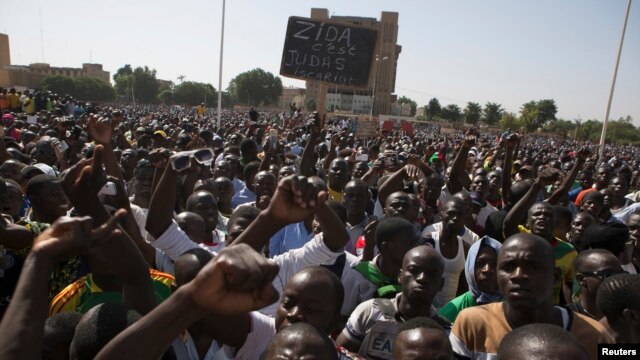
Pro-democracy protesters chant slogans against military rule at Place de la Nation in Ouagadougou, capital of Burkina Faso, Nov. 2, 2014.
DAKAR, OUAGADOUGOU—
Gunfire rang out at the headquarters of Burkina Faso's national television station Sunday, and thousands of protesters gathered at the capital's main square to call on the military to hand power to civilian authorities following the resignation of the country's longtime president.
The brief rally in Ouagadougou ended when opposition leaders headed into closed door talks with the country's military leaders.
Meanwhile, the situation took a violent turn as soldiers from the presidential guard fired shots outside the national TV headquarters shortly after opposition party head Sara Sereme arrived there accompanied by a group of supporters.
The soldiers fired into the air and there were no injuries reported. Reports from the scene say soldiers may have seized control of the building.
The opposition has accused the army of hijacking the people’s revolution and had pledged more protests. Opposition member Jean Hubert Bazié read the declaration late Saturday.
He said “the political opposition and civil society organizations affirm that the victory resulting from the people’s insurrection belongs to the people and as a result the leadership of the transition belongs to the people and should not be confiscated under any circumstances by the army.”
The statement said this transition should be of a “democratic and civilian” nature.
After Compaore's resignation two military officers each made statements claiming to be in charge. The military sorted it out Saturday, naming one of them, Lt. Col. Yacouba Issac Zida, as head of the transition.
Zida, the number two of the country’s elite presidential guard, has pledged to hold democratic elections “as soon as possible,” but has given no specifics.
He suspended the constitution, declared a nighttime curfew and shut the country’s borders.
The United Nations, African Union and the Economic Community of West African States sent a delegation to Burkina Faso.
U.N. special representative Mohamed Ibn Chambas called for dialogue and said Sunday “we hope for a transition led by a civilian and in line with the constitution." “If that is not done,” he said, “the consequences are clear.”
He said ECOWAS and the AU have statutes in place. He said they must “do all they can” to avoid a suspension of Burkina Faso and the ordering of sanctions.
The constitution says the head of the National Assembly takes over in the president's absence. However, he has reportedly also fled the country and the army dissolved the National Assembly. In such a case, the Constitutional Court could name a new leader.
The delegation said the regional Ebola epidemic makes it especially important the country’s interim leadership restore government administration and public services as soon as possible. Burkina Faso has not had any confirmed cases of Ebola. Neighboring Mali declared its first case in October.
|
|
